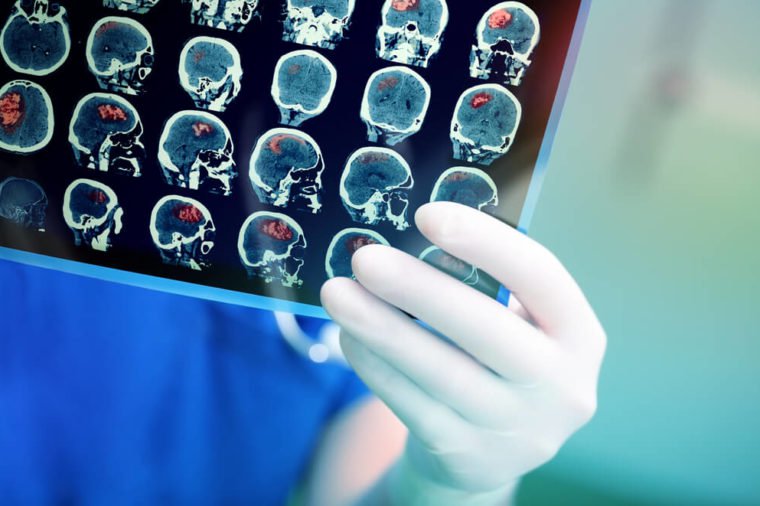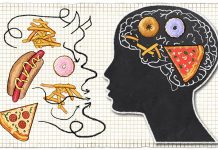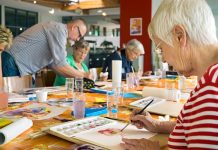Alzheimer’s disease has no cure, but ongoing research shows promise for reducing the risk and delaying the onset of this neurodegenerative disorder.
Understand Alzheimer’s disease

Alzheimer’s disease is the leading cause of dementia, accounting for approximately 80 percent of dementia cases and affecting more than 5.5 million people in the United States. But all dementia is not Alzheimer’s, says David Knopman, MD, a neurologist at the Mayo Clinic in Rochester Minnesota, and Fellow of the American Academy of Neurology. Dementia is a general term used to describe a set of symptoms that may include memory loss and difficulties with thinking, problem-solving, or language. Alzheimer’s is a physical disease that targets the brain, causing problems with memory, thinking, and behavior. It is also age-related (symptoms usually start at age 65) and progressive as symptoms usually develop slowly and worsen over time. Research shows that plaques and tangles, two proteins that build up and block connections between nerve cells and eventually damage and kill nerve cells in the brain, cause the symptoms of the disease. Learn more about the difference between Alzheimer’s and dementia.
Get a baseline brain scan

Neuroimaging, using magnetic resonance imaging (MRI) or computed tomography (CT), is one of the most promising areas of research for the early detection of Alzheimer’s disease, according to the Alzheimer’s Association. “The idea is to start prevention early,” says Gayatri Devi, MD, neurologist, clinical professor of neurology, Downstate Medical Center. “We get routine colonoscopies in our fifties, but the risk for colon cancer is less than the risk for dementia.” Structural imaging can reveal tumors, evidence of strokes, damage from severe head trauma, or a buildup of fluid in the brain. “A baseline brain MRI can reveal the evidence of mini-strokes that you may have had without knowing,” says Dr. Devi. Find out about the 7 stroke symptoms you might be ignoring.
Get enough sleep

When you toss and turn all night, levels of brain-damaging proteins in the cerebrospinal fluid can rise: One study suggests that those with chronic sleep problems during middle age may increase their risk of Alzheimer’s later in life. “You have to commit to the importance of sleep,” says Dr. Devi. “I prioritize sleep as one of the most important activities I do—I will leave a party early in order to get a good night’s sleep.” Here are 15 myths about Alzheimer’s you should stop believing.
Stay socially active

Say yes to those social invitations! Studies reveal that people with a large social network are at lower risk of Alzheimer’s and dementia. “There is something intrinsically valuable about social engagement,” says Dr. Knopman. “It makes sense that those who are more engaged, especially socially, will think more positively and have a better outlook on life.”
Keep learning

People with advanced degrees have a lower risk of Alzheimer’s. Education seems to build a “cognitive reserve,” which enables the brain to better resist neurological damage. “Higher education has a powerful effect,” says Dr. Knopman. It’s never too late—check out the continuing education courses offered near you.
Be bilingual

Speaking more than one language can protect against Alzheimer’s disease and other types of dementia, according to research. While no one is sure why a second language helps so much, Dr. Knopman theorizes that the effort to communicate bilingually is like a workout for the brain, helping preserve gray matter and neurons. These 50 everyday habits reduce your risk of dementia.
Do it yourself

Challenging your brain in new ways can enhance memory as you age. Dr. Devi has her own take on this: “If there is a problem with the phone or the plumbing, I will try to fix it,” she says. “If I try to figure out how to fix this on my own, it is good for my brain.” Right now she’s designing and building a window seat. “It is a way to keep different parts of my brain thriving.” Check out these 8 brain-boosting activities.
Stay active

Exercise crucial to your wellness and your brain. In research, people who exercise regularly can slow cognitive decline by as much as 38 percent. According to the Alzheimer’s Society, the combined results of 11 studies indicate that regular exercise can reduce the risk of developing dementia by about 30 percent; it drops the risk of Alzheimer’s by 45 percent. “When you are physically active, you burn more calories and you’re less likely to be obese,” explains Dr. Knopman. “You’ll have better cardiovascular health because you are pushing your heart rate.” Don’t miss these 10 early signs of Alzheimer’s every adult should know.
Try turmeric

Turmeric contains curcumin, a chemical that has been shown to help with inflammation. Used to treat a variety of ailments and conditions such as osteoarthritis and high cholesterol, turmeric has also shown promise as a treatment for Alzheimer’s disease. Dr. Devi notes that the research is preliminary, but it suggests that curcumin can help keep the nerve cells functioning and healthy. “You want to keep as many nerve cells functioning with as many connections as possible,” he says.
Take care of your heart

“What is good for the heart is good for the brain,” says Dr. Devi. Conditions such as high blood pressure, diabetes, and high cholesterol, which increase the risk of cardiovascular disease, may also increase the risk of developing Alzheimer’s, and a new study shows that middle-aged people with risk factors for heart attacks and stroke are also more likely to develop changes in the brain that can lead to the disease. “Anything that keeps the heart healthy is directly related to brain health,” Dr. Devi says. Be sure you know to avoid these 9 habits that seriously increase your dementia risk.
Lower your stress levels

Persistent stress can take a toll on the brain, and research indicates that chronic stress can accelerate Alzheimer’s disease. When you’re stressed, your body releases cortisol, a hormone linked to memory trouble. In addition, researchers have found that stress can lead to conditions such as depression and anxiety—which also ups the risk for dementia. “Eliminating stress helps reduce the amount of cortisol and optimizes glucose utilization, which your brain needs for food,” says Dr. Devi. Check out these 15 five-second strategies for shutting down stress.
Try the MIND diet

A combination of the Mediterranean diet and the DASH (Dietary Approaches to Stop Hypertension) diet, the MIND diet is designed specifically for brain health. (MIND is short for Mediterranean-DASH Diet Intervention for Neurodegenerative Delay.) The diet is pretty pleasant: You eat at least three servings of whole grains a day, two portions of vegetables (one of which must be a leafy green), snack on nuts, eat lean proteins like chicken and fish, berries, and have a glass of wine a day. According to research, those who adhered to the diet rigorously were able to lower their risk of cognitive decline later in life. You can’t trust all diets, warns Dr. Knopman, but he likes this approach: “I tell my patients that if you follow a reasonable diet with lots of fresh fruits and vegetable that balances different food groups, and avoid obesity, you will be OK.” Be sure to include the 9 best foods for your brain.
Get your snoring checked out

Another way to wreck your sleep without realizing it is with sleep apnea. According to the National Institutes of Health, sleep apnea occurs when a person’s upper airway becomes blocked repeatedly during sleep, reducing or completely stopping airflow. Many factors—from obesity to large tonsils to neuromuscular disorders—can cause sleep apnea. If left untreated, sleep apnea not only prevents restful sleep, but it can increase the risk of developing certain health conditions. “If left untreated, sleep apnea has significant cardiovascular consequences and consequences of mental function,” says Dr. Knopman. Recent research also links sleep apnea to the accumulation of biomarkers for Alzheimer’s disease. Treatment may save your brain, not to mention your life. Find out the 9 silent signs of sleep apnea.
Protect your head

According to the Alzheimer’s Association, there is a strong link between serious head trauma and developing Alzheimer’s later in life, especially if the injury involves loss of consciousness. A review of research suggests head injuries that require medical attention may increase the risk of dementia and Alzheimer’s disease. Wear a helmet while cycling, make your home fall-proof, and always use a seat belt to help protect your noggin. Make sure you know the 7 signs that you need to go to the ER after a head injury.
Have some tea and honey

Green tea has loads of health benefits: One study found that a compound in the beverage can disrupt the formation of toxic plaques that contribute to the Alzheimer’s disease. In addition, Acacia honey (a type of honey produced by bees who feed on Acacia flowers) is considered to be highly nutritional with strong antioxidant and immuno-modulatory potential, making it a potential candidate for both cancer prevention and as a therapeutic agent in the management of Alzheimer’s disease. Next, here are 16 things that people with Alzheimer’s wish you knew.
Source: RD


















































